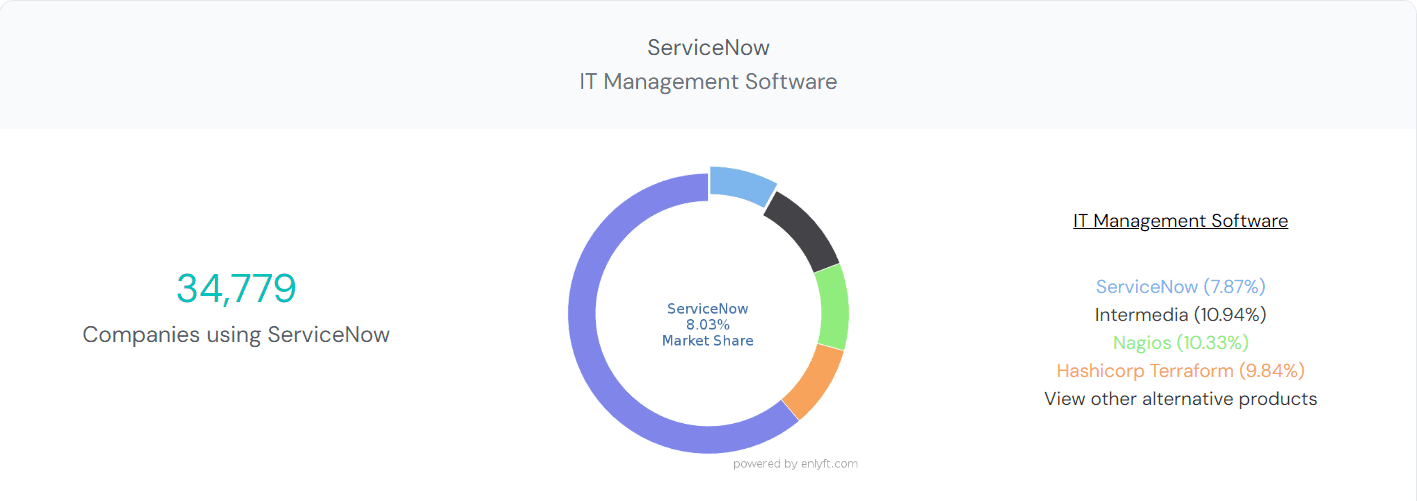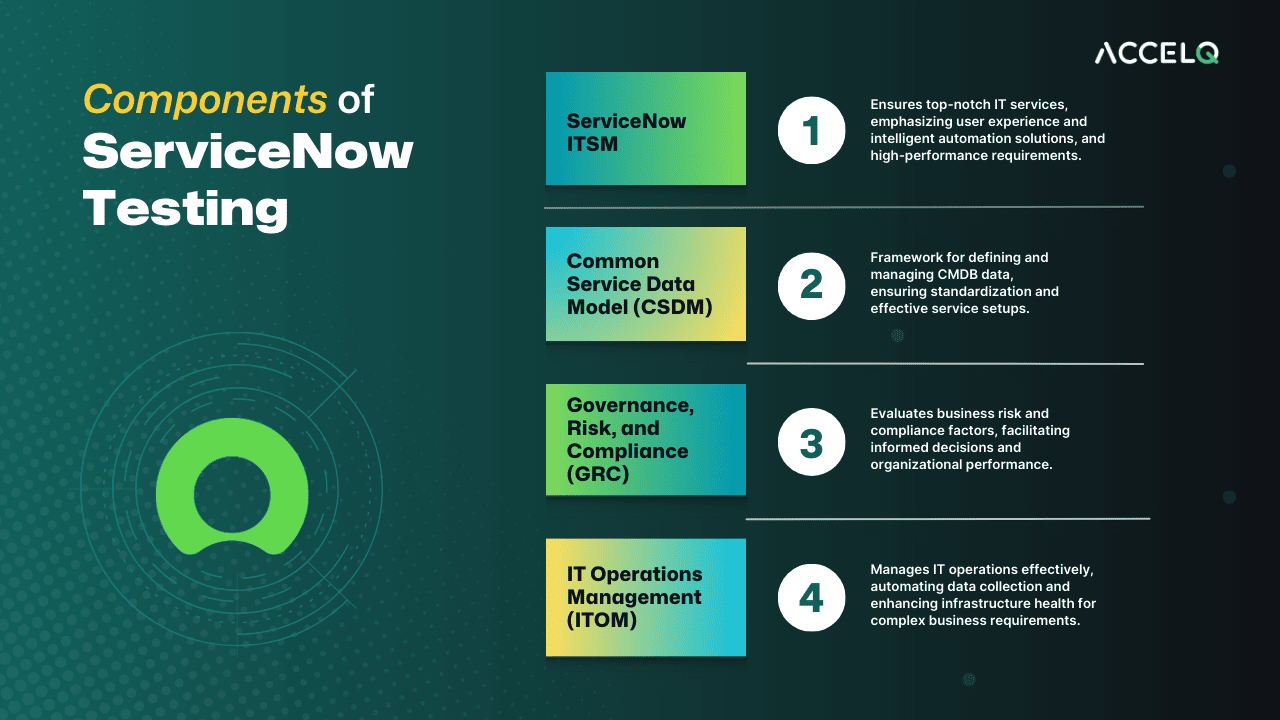What is ServiceNow Testing? Example & Best Practices

In today's digital era, the ServiceNow platform empowers teams with the capabilities they need to unleash the power of IT. By modernizing and automating workflows, bridging rigid enterprise silos, and elevating employee experience, the platform helps improve communication and collaboration across the enterprise.
Furthermore, it enables teams to embed intelligence into every interaction they have with customers, paving the way for reimagined customer experiences.
Enlyft research shows that over 20,000 companies, many U.S.-based in the software sector, trust ServiceNow. With a 7.27% market share, it ranks among the top 4 IT management software brands globally.

What is ServiceNow Testing?
ServiceNow is a powerful cloud-based platform that optimizes digital experiences and simplifies workflows by seamlessly integrating different organizational functions and systems. Testing ServiceNow is essential to guarantee its application's proper functioning and defect-free nature.
Important applications involve ServiceNow ITSM for handling Incident, Problem, and Change Management, ITBM for managing Project Portfolios, and ITOM for managing events. Efficient ServiceNow testing streamlines legacy systems and minimizes the need for manual documentation, resulting in enhanced IT support and service delivery.
SUGGESTED READ - What is Unit Testing? 6 Best Practices to Do it Right
Why ServiceNow Testing?
Testing ServiceNow is essential for staying ahead of technological changes, effectively managing its wide range of services, and efficiently handling regular updates. Ensuring the ServiceNow platform's efficiency, quality, and currency is a top priority.
We ensure it is tailored to meet each customer's unique needs and are regularly updated with new features and improvements. This is crucial for maintaining and improving business operations and end-users' experience.
- Staying up-to-date with the latest technologies and customer demands is essential for success.
- Ensures that ServiceNow operates seamlessly and meets ongoing business requirements.
- Tests new features and updates for functionality and compatibility.
- Ensures and enhances operational efficiency and competitiveness.
Testing Types for ServiceNow Applications
| Type | Description | Skills Required |
|---|---|---|
| Manual Testing | Tests the functionality of an application from an end user’s perspective. Testers manually execute test cases based on requirements to validate functionality. | Minimal technical knowledge; analytical skills. |
| Automation Testing | Tests application functionality using automation tools. This type of testing is typically used for regression testing. | Technical knowledge; programming skills. |
Components of ServiceNow Testing
ServiceNow testing components enable rapid automation for any service management situation. Different parts make up ServiceNow.
ServiceNow ITSM:
It enables high-quality IT services for end consumers. It means focusing on user experience, continual enhancements, intelligent automation solutions, and high-performance requirements.
Common Service Data Model (CSDM):
It is a framework for defining and managing CMDB data. It teaches Service Modeling fundamentals and standards. This component is also essential to service setups.
Governance, Risk, and Compliance (GRC):
Evaluate business-impacting risk and compliance factors. This allows you to make better judgments and boost organizational performance. This includes identifying risks and concerns early on so you can change your risk strategy.
IT Operations Management (ITOM):
ServiceNow ITOM is about managing IT operations well. IT teams may work manually when collecting data from monitoring tools that affect infrastructure health. To overcome obstacles, reinvent and improve cloud operations. ServiceNow's IT asset, risk, and change management components complete its end-to-end solution for complicated business requirements.
Example of ServiceNow Testing
Test Case: Create an Incident in ServiceNow
Goal: Ensure that users can create a new incident successfully.
Here are the steps:
- Please log into ServiceNow.
- Go to the Incident Management module.
- Choose the option to “Create New Incident”.
- Please complete the required fields such as Caller and Short Description.
- Please click on the “Submit” button.
Result: The incident creation was successful, and the incident ID is displayed on the screen.
This test verifies that the fundamental functionality of creating an incident operates as anticipated, which is vital for day-to-day operations in an IT service environment.
Benefits of ServiceNow Testing
- Strive for a product that is free of defects.
- Ensure all system functionalities function correctly while updates and changes are thoroughly validated before production.
- User experience on the platform is always measured and monitored.
- Evaluate the collaboration between various components of the platform.
- Ensure compatibility with third-party integrations and plugins.
- Optimize testing procedures and expedite ServiceNow rollouts.
- Make sure the development components align with the user’s specifications.
Best Practices for Effective ServiceNow Testing
Now, let's explore some effective strategies for managing tests in ServiceNow.
- Please provide a list of the most important functionalities and workflows. In addition, various testing processes must be streamlined and automated to conduct ServiceNow test automation effectively.
- Instead of investing in resources with advanced-level programming skills to automate complex testing activities, consider using a codeless or low-code ServiceNow test management platform that can make testing faster and more thorough.
- Utilize pre-built and pre-defined modular testing components. They assist in simplifying ServiceNow testing and decreasing the requirement for extensive maintenance.
- Thorough documentation of the desired level, type, and quantity of tests to be conducted on the ServiceNow platform. This will facilitate seamless tracking and mitigate scope creep.
- Effective communication of testing needs and schedules to all relevant parties and delegating roles and tasks to team members ensures a clear understanding of their testing responsibilities.
- Equip testers with cutting-edge tools and capabilities to enhance their testing efficiency and boost their confidence.
How Does ACCELQ Enable Seamless ServiceNow Testing?
Testing an enterprise platform like ServiceNow requires testers to have extensive knowledge and know-how of the platform. Moreover, it entails having a lot of time at hand to write unique test cases and run test suites.
Since it is practically impossible to test the Now platform manually, organizations need a reliable and sturdy testing platform to help overcome day-to-day testing challenges.
ACCELQ helps automate ServiceNow testing, reducing test complexity. Using no-code apps that leverage your most-loved cloud-native platforms, ACCELQ helps take the burden off development teams and make the most of codeless technology to ensure that patches don't break testing.
To that end, using ACCELQ, you can:
- Get access to pre-built codeless automation test suites that are explicitly modeled for unique business processes.
- Leverage test assets that are designed to work in multi-cloud environments, making it easier to execute efficient ServiceNow tests.
- Easily build your no-code test cases and modify them as needed to fit the test requirement at hand.
- Make the most of powerful and comprehensive AI-enabled testing capabilities and perform testing intelligently.
- Simplify testing requirements and ensure the Now platform offers next-level user experiences 24×7.
- Take a unified approach to test design through robust change management across the quality lifecycle.
- Enable business process-focused automation across the tech stack and ensure end-to-end business assurance.
- Use a single platform to connect to all your testing needs across channels and devices.
Yuvarani Elankumaran
Technical Consultant at ACCELQ
Yuvarani Elankumaran is a highly skilled technical consultant at ACCELQ. With over a decade of experience in the field of Test Automation, Yuvarani is a seasoned professional who is well-versed in a variety of programming languages and automation frameworks.
Discover More
 Using Branching Strategies to Efficient Testing in DevOps
Using Branching Strategies to Efficient Testing in DevOps
Using Branching Strategies to Efficient Testing in DevOps
 Guide For Compatibility Testing: Techniques and Best Practices
Guide For Compatibility Testing: Techniques and Best Practices

































